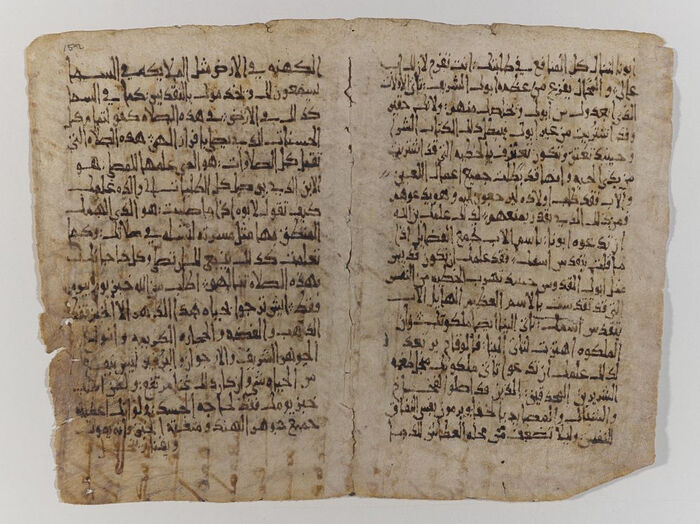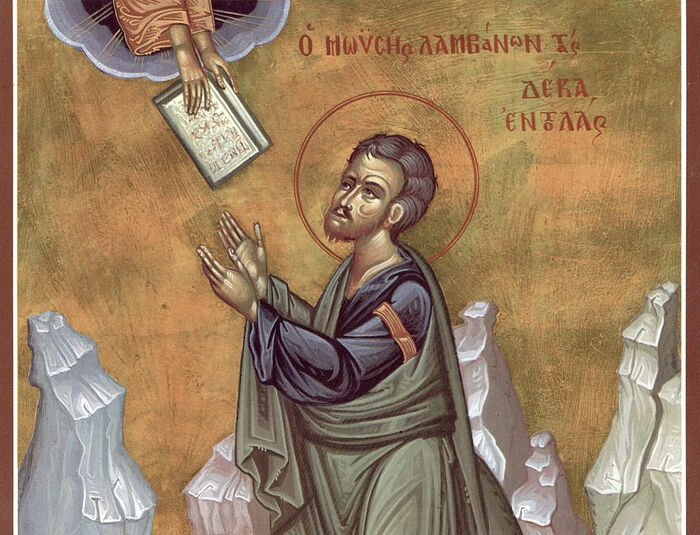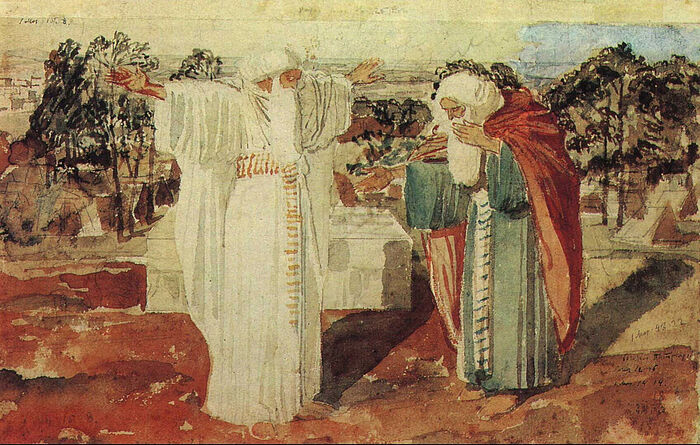We continue our talks on the Book of Acts with Sergei Komarov, a well-known catechist based in Moscow.
3:19 Repent ye therefore, and be converted… Conversion is a synonym for repentance. Repentance in Greek is “metanoia,” which means a change of mind. The word “convert” is constantly used by the Old Testament prophets. Isaiah and Jeremiah did nothing but tell the people of Israel: Convert, repent, that your sins may be blotted out.
It’s an interesting image: Sins can be “blotted out,” they can be crossed out, as it were, from some book. This book imagery is used quite often in the Bible. You can be inscribed in the Book of Life, but you can also be crossed out of it, tentatively speaking. Or there’s this image: A list of our sins that Christ tears up on the Cross. It’s interesting that in ancient times, people wrote with an ink that was acid-free and didn’t get absorbed into the papyrus. The ink was as if lying on top of the paper or leather, and it was very easily wiped away.
There’s the concept of palimpsest. It’s an ancient manuscript where they erased the top layer and wrote a new one. For example, there’s a manuscript of the Bible called the Codex of Ephraim the Syrian. It’s a palimpsest. At first, the text of the Bible was written on it, and then the texts of St. Ephraim the Syrian were written on top. Now scholars have removed the top layer and revealed the original, from the fifth century.
So, in antiquity they wrote on papyrus or leather, then they wiped it away and wrote again, because books were expensive. It’s the same logic with the image of our sins being washed away and then possibly appearing again. So, our names can be written in the Book of Life, and they can be blotted out. Every ancient city had a book with the names of the residents. When someone died, their name was removed from the book this way. You were born, and they recorded your name; you died, and they crossed you out. These are the images at play here. Sins can be blotted out and made to be as former sins.
3:19 … When the times of refreshing shall come from the presence of the Lord.
3:20 And He shall send Jesus Christ, Which was appointed unto you. Again, this “appointed,” or “predestined.” What do you think, when it says: times of refreshing shall come from the presence of the Lord—what is this about? What times is this? It’s the Kingdom of God. Since there’s a connection in the text here with the Second Coming—And He shall send Jesus Christ, then remember that the Second Coming opens the Kingdom of God. This is the “times of refreshing.”
3:21 Whom the Heaven must receive until the times of restitution of all things, which God hath spoken by the mouth of all His holy prophets since the world began. What is this about: Whom the Heaven must receive? It’s about the Ascension of Christ. Until the times of restitution of all things, that is, He will also return. Which prophets is St. Peter talking about? He’s quoting two places from the Old Testament at the same time. This is a peculiarity of Apostolic speeches—two or even three prophecies are combined into one. Sometimes they pull from various books. In this case, it’s a combination of the books of Deuteronomy and Leviticus.
3:22 For Moses truly said unto the fathers, A Prophet shall the Lord your God raise up unto you of your brethren, like unto me; Him shall ye hear in all things whatsoever He shall say unto you. This is the first prophecy, from Deuteronomy 18. Then:
3:23 And it shall come to pass, that every soul, which will not hear that prophet, shall be destroyed from among the people—this is from Leviticus 23:29. In the first prophecy we read the word “Prophet,” with a capital “p.” Why do you think that is? It’s about Christ. “Prophet” is one of the Messianic titles of Christ. By the way, look how many titles we’ve hit on in today’s talk: Prince of life, Holy, Righteous, Prophet.
Also in this speech, Moses prophesied for the first time about the institution of prophets. After all, there were no prophets before Moses. Moses is considered the first prophet in Israel. Moses was speaking, in fact, about two things at the same time: that God will give the institution of the prophets to Israel and that He would send the Messiah—the Prophet. This is why “Prophet” has a capital letter here—because it’s about Christ. Remember when the Jews asked John the Baptist: “Are you the Prophet?” and he said, “No.” He understood that they were asking him in this sense: Are you “the Prophet,” with a capital letter, that is, the Prophet that Moses spoke about—“Are you the Messiah?” And he said no. Although he was a prophet—but just a prophet—not the Christ. In this case, “Prophet” is a title for Christ.
3:22 Him shall ye hear in all things whatsoever He shall say unto you.
3:23 And it shall come to pass, that every soul, which will not hear that Prophet, shall be destroyed from among the people.
From what people? From the people of God. In the Old Testament it was Israel. And those who didn’t listen to the commandments of God, the commandments of the prophets, were destroyed from among the people. Today we understand the phrase, Destroyed from among the people, as a loss of salvation, as exclusion from the Church—the new people of God.
3:24 Yea, and all the prophets from Samuel and those that follow after, as many as have spoken, have likewise foretold of these days.
According to the testimony of the Apostle Peter, all the prophetic books—the twelve Minor and four Major Prophets—speak of Christ and the Church.
You can reread these prophecies from a new angle and look for Christ there.
And the conclusion:
3:25 Ye are the children of the prophets, and of the covenant which God made with our fathers, saying unto Abraham, And in thy seed shall all the kindreds of the earth be blessed.
How many testaments have there been in sacred history in general? Some say there were two—the Old and New. Are there other options? The Noahide Covenant, yes. And, by the way, the word “covenant” is first heard here in the book of Genesis, in the sixth and ninth chapters. There’s also the covenant with Abraham in Genesis chapter fifteen. How many testaments are there overall? Really, there’s one covenant, which people constantly violate, and God renews it. The New Testament of the Lord Jesus Christ in His blood is the final covenant. There will be no other. It’s the new and the final.
On the other hand, we can count many covenants. Let’s take the covenant with Adam and Eve. Although the word “covenant” isn’t used there, there are certain duties of man and duties of God there. This is, in essence, a covenant. Then the covenant with Noah, with Abraham, with Moses and the people of God. There was one other separate covenant, a sort of VIP covenant with David, when God promised to place the Messiah on his throne, from his own generations.
So the word “covenant” is used in the Bible often. St. Peter says: Ye are the children of the prophets, and of the covenant, and he specifies that he’s referring to the covenant with Abraham. The most important phrase is and in thy seed shall all the kindreds of the earth be blessed. God made many promises to Abraham. We can count eight promises laid out in Genesis 12:
-
I will show you the land where you’re to go
-
I will make of you a great nation
-
I will bless you
-
I will magnify your name
-
You will be a blessing
-
I will bless those who bless you and curse those who curse you
-
All families will be blessed in you
-
I will give this land to your seed
Let’s look at the promise: In thee shall all families of the earth be blessed (Gen. 12:3). Over time, the form of this blessing changed: And in thy seed shall all the nations of the earth be blessed (Gen. 22:18). This promise should be recognized as the most important for us. The Apostle Paul explains its meaning in detail in the Epistle to the Galatians.
Proving to the Christians of Galatia the needlessness of Jewish rites, assuring them that they have everything necessary for salvation in the Church, the Apostle builds evidence based on the story of Abraham. He connects the main argument—the receiving of the Holy Spirit by the Galatians in the Church—with events from the life of Abraham. In particular, St. Paul recalls God’s promise to Abraham about the blessing “in his seed.”
Here’s what he writes:
He therefore that ministereth to you the Spirit, and worketh miracles among you, doeth He it by the works of the law, or by the hearing of faith? Even as Abraham believed God, and it was accounted to him for righteousness. Know ye therefore that they which are of faith, the same are the children of Abraham. And the Scripture, foreseeing that God would justify the heathen through faith, preached before the Gospel unto Abraham, saying, In thee shall all nations be blessed. So then they which be of faith are blessed with faithful Abraham. For as many as are of the works of the law are under the curse… That the blessing of Abraham might come on the Gentiles through Jesus Christ; that we might receive the promise of the Spirit through faith… Now to Abraham and his seed were the promises made. He saith not, And to seeds, as of many; but as of one, And to thy seed, which is Christ (Gal. 3:5-10, 14, 16).
This passage has the meaning that the seed of Abraham, in which all the tribes of the earth will be blessed, is Christ. And Abraham’s blessing consists in receiving the Holy Spirit in the Church. And this blessing is received by any man who believes in Christ and lives in the Church.
Interestingly, in the original context, the “seed” is Isaac, the son of Abraham. But in the future, the promise of the “seed” takes on a broader meaning and significance.
It turns out that the Christian faith and the Christian Church is the blessing of Abraham, which we, yesterday’s pagans, receive. Everything happens through Christ, Who is the Seed of Abraham. It was predicted thousands of years ago, and interpreted by the Apostle Paul.
Moreover, the promise has three levels. The first is the multiplication of the seed equal to the number of the grains of sand in the sea. Did Abraham make it to see the fulfillment of this promise? No. Abraham only saw the birth of his only son from Sarah—Isaac. He had to behold the multiplication of his seed, like the stars of heaven and as the sand of the seashore, from Heaven. This is patience, extending even to the heavens!
The second level is: and thy seed shall possess the gate of his enemies (Gen. 22:17). This is a prophecy of the conquest of Palestine by the Jews. Again, Abraham saw the fulfillment of this promise only from the other world.
And the third point of the prophecy: And in thy seed shall all the nations of the earth be blessed, began to be fulfilled, but it has yet to be completely fulfilled. This is about the spread of the Gospel teaching across the entire earth. Christ prophesied that before the end of the world, the Gospel must first be published among all nations (Mk. 13:10). Every nation must offer some kind of element of faith, some Christian souls. This process began long ago, but it hasn’t finished. There are still nations today where the Gospel hasn’t been preached.
Amazingly, Abraham is even now waiting for the fulfillment of this promise. Abraham’s longsuffering is truly boundless—he waited during his earthly life, and after his earthly life he continues to wait and will wait even unto the end of the world. See what patience is given to us as an example!
In the last verse, St. Peter explains how to understand the word “seed:”
3:26 Unto you first God, having raised up His Son Jesus, sent Him to bless you, in turning away every one of you from his iniquities.
This is the blessing of Abraham! It comes through the “seed,” through Christ, and this is the reception of the Holy Spirit in the Church, the life in the Church. Here Christ is called the Son of God.
It’s interesting that it says “He was sent to you first.” In the Epistle to the Romans, the Apostle Paul says: Tribulation and anguish, upon every soul of man that doeth evil, of the Jew first, and also of the Gentile; But glory, honour, and peace, to every man that worketh good, to the Jew first, and also to the Gentile (Rom. 2:9-10). What does this primacy of the Jews mean? It has meaning with both a plus and a minus sign. Christ is the Messiah of the Hebrew people and the Savior of the world. He came to the Jews, and the Apostles, that is, the Church, went to the Gentiles.
The Jews had to be the first to hear the Gospel, but they have more responsibility, more will be asked of them, because they are the sons of the Covenant, and God expected them to accept Christ and repent. The Gentiles shouldn’t be offended that the Jews are first. All the same, God saves everyone, He desires to save everyone, but first the Jews, and then the Greeks. From chapters nine, ten, and eleven of the same Epistle to the Romans, we know that the history of the world will end with the Jews coming into the Church; that is, everything happens as if for their sake. The spiritual history of mankind began with them, and it will end with them.
And the Apostle Paul offers an amazing idea, by the way, which he writes only in the Epistle to the Romans—nowhere else—that God hasn’t forsaken His people, meaning ethnic Israel. They are enemies for your sakes (Rom. 11:28). A certain number of Gentiles must enter the Church. How many we don’t know—it’s a mystery. And then—the end! For I would not, brethren, that ye should be ignorant of this mystery, lest ye should be wise in your own conceits; that blindness in part is happened to Israel, until the fulness of the Gentiles be come in (Rom. 11:25). As concerning the Gospel, they are enemies for your sakes: but as touching the election, they are beloved for the father’s sakes (Rom. 11:28).
The spiritual history of the world begins with the Jews, and it will end with them, when a certain remnant enters the Church. But how many this will be, we don’t know—whether it’s a small part of Israel or all of it. Then the curtains close—the Second Coming of Christ and the end of the world.
Thus, the Apostle Peter calls the Jews to repentance and uses complex constructions that were very clear to the Jews then. The rest is even more interesting and complex, but we’ll talk about that in the next talk.
To be continued…









